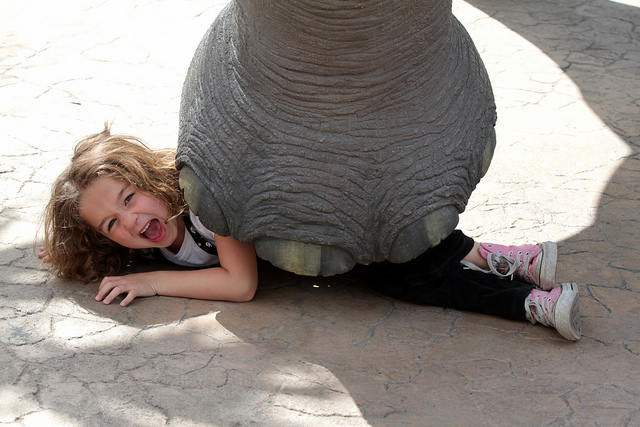
Here are a few don’ts that found their way onto my easy parenting list; some came from the Freehold Parents Anonymous Group members and one came from Chelsey – who felt we were too strict (A sure sign of good parenting!).

Correcting children is a parent’s duty but doing it in front of others is terribly demeaning and damaging to a child’s self-esteem. When other people see a parent berating a child in public, they don’t think, ‘what a great parent,’ they are thinking, ‘oh that poor child.’ If correction is truly needed immediately then the parent should call the child aside and have a short conversation in private.
Don’t Make Promises
Getting locked into a promise is dangerous for a parents’ credibility. If for some reason parents cannot follow up on the promise then children are disappointed and they may feel they cannot count on a parent’s word. A much better option is to say, “I will try.”
Don’t Be Your Child’s Friend
Children may have many friends in their lives but a parent should not be one of them. Parents fill specific duties like setting rules and limits, giving direction, providing basic needs. Friends provide a peer perspective as a listener, confidant and social outlet. Parents and friends cannot swap roles and the relationships remain successful; blurring the line between parent and friend can ultimately weaken a parent’s authority. Kids can tell parents a secret but there are things they would tell a friend that they would never tell their parents. Kids all need secret-keeping friends so parents – stay in the parenting role.
Don’t Be a Dictator
We all are busy and pressed for time but when parents only give instructions, directives or demands then over time the child will stop taking initiative and thinking for themselves. It is normal for all children think their parents are ‘too strict’ but parents must give rules with reasons that allow for free thought and discussion to encourage developmental growth. In the end, parents want a child that is a free-thinking, reasoning human being and not a robotic younger form of themselves.
Don’t Lecture or Preach
The term ‘parent deaf’ came about during the 1960s when parents were told to talk and reason with children but many parents turn short discussions into long-winded lectures with captive audiences. Parents who need to convey ideas or information should think like an editor and cut out unnecessary words so that children hear and remember what is said.
Don’t Be Afraid to Be Wrong
Nobody is perfect and that includes parents. Kids remember good and bad examples so it is much easier to admit mistakes than to try to cover it up. Parents can teach children to graciously admit and correct or apologize for the mistake. Private joke: “Yes, Chelsey, you were right, I drove in the wrong direction on I-40.”
Don’t Parent With Money
Sometimes parents try to make up for something they feel is lacking in their children’s lives by buying things or giving in other ways. (Divorced parents often fall into this trap.) If the child’s other parent is not there, having a video game or designer sneakers is not going to fill that void. Honor that pain and loss rather than trying to pretend it doesn’t exist.
Don’t Forget the Difference Between Bribes and Rewards
Bribes are not planned beforehand; parents are put under pressure for a payoff of some sort and kids are viewed as being in charge. Rewards are usually planned by parents ahead of time and are often given after a behavior or work; rewards are given and received with mutual respect. Tip to remember: Bribes are Bad.
Don’t Exempt Yourself, Fathers
Depending on the sex of the child, fathers and mothers contribute about the same amount of DNA to children. In today’s world there is no reason that a father cannot contribute half the nurture and guidance to a child from birth. Mothers have traditionally filled the role of ‘natural parent expert’ but in reality there is nothing to preclude fathers from learning and performing all the same duties of a mother except giving birth and breastfeeding. Boys and girls both need valuable input from their father. My mantra: You get out of it [parenting] what you put into it.
Don’t Compare Siblings or Friends and Don’t Play Favorites
Comparing siblings is not a new phenomenon; my mother told me that she wished I were like my older brother. I should have told her I wished she were more like someone else, since that is how much sense that makes. Comparing any child is to insult the child they are. Celebrate the one-of-a-kind uniqueness of each child with all their quirks, talents and qualities.
Don’t Spank or Hit Children
To hit a child is like trying to force a size-9 foot into a size-5 shoe – it does not work. The parent who hits a child is a parent that has stopped looking for solutions. If parents need to get a child’s attention then tap them on the shoulder or give them a hug. There is never a good reason to hit a child. Recent studies prove that a child’s DNA can be changed by abuse and IQs of kids subjected to corporal punishment are lower – are there any stronger reasons not to hit a child?
Don’t Take It Personally
When children bump up against a rule or limit, parents are not going to be popular so it is only natural that the authority in charge will get the flack. Just ask any parent who got a ticket for speeding how happy they were with the officer!
Don’t Discourage a Child’s Interests
Children will have many interests in the first eighteen years of life and those will change periodically. I remember being absorbed by rock collecting, horses, archaeology, anything UFO or Native American, beading, carving, boating and Batman for the short list. Children need to find their way in the world and if parents want to discourage one interest then ten should replace it.
Don’t Verbally Abuse Children
The best way to influence children is to get their cooperation. Mild looks of disapproval are much more effective than hurting them with words. Abuse might control them for a time but long-lasting change is internal. Verbal abuse damages self-esteem and breaks down the child/parent relationship. Calling a child names can sometimes be a self-fulfilling prophesy. My mantra: If you are not building up, you are tearing down.
Don’t Panic Over the Latest Parenting News
Does anyone remember the alar scare of the late 1970s? Alar was sprayed on apples to make harvesting them easier and also helped preserve the apples. It turned out there may have been a risk of cancer, according to the Environmental Protection Agency (EPA) and the chemical was voluntarily removed by the manufacturer even though there was little proof. One of the latest scares is that immunizations are causing autism and some parents have avoided getting the proper preventive inoculations for their kids, thus, causing a very real resurgence in childhood illnesses. For the most part, the basic healthcare in the U.S. is protected and real conditions are made known rather quickly. The take away is that parents should relax and not panic at every news story predicting the end of mankind.
To paraphrase my father words, “Opinions are like noses, we’ve all got one.” Tell me what you think parents should not do?
NOTE: No child or elephant was harmed during the making of this photo.
PHOTO CREDIT: Courtesy of Peasap Under Flicker/CC License Original .